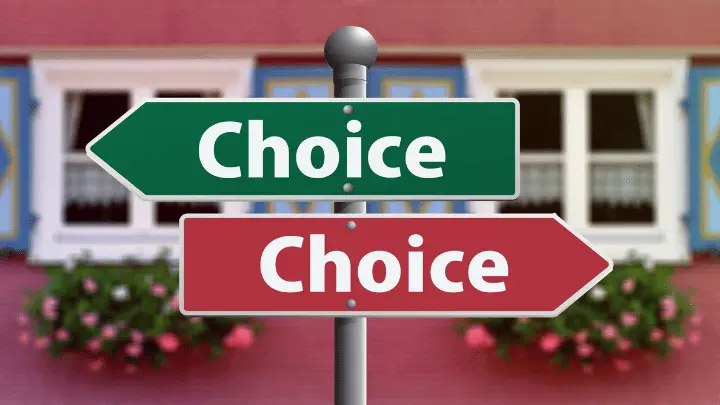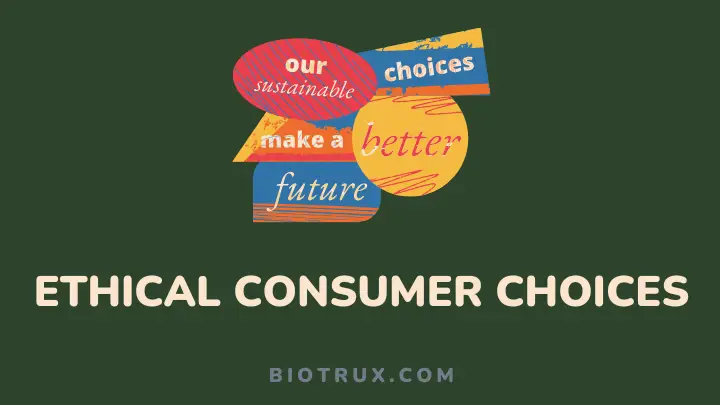Hello there! Are you tired of consuming without considering your choices’ ethical implications? Ethical consumer choices are becoming increasingly important in today’s culture. Our decisions can greatly influence people and the environment, from food to clothes to gadgets.
Making ethical decisions might be difficult, but you can make a difference with a few key considerations. You can make a conscientious decision that corresponds with your values by considering a product’s meaning, impact, and social, economic, and environmental aspects.
Join me as we explore the world of ethical consumerism and how we may positively impact our planet while still enjoying the things we love.
Understanding Ethical Consumer Choices
In a world where businesses constantly battle for our attention, it’s easy to overlook the impact our purchasing decisions can have. Making ethical consumer choices means looking beyond the label and into the practices and values of the companies we support.
Ethical consumerism includes everything from purchasing locally made products to buying from companies with sustainable and environmentally conscious practices. As consumers, we can influence how companies operate, so why not choose those committed to social responsibility?
Supporting ethical brands ensures fair wages for workers, reduces waste and pollution, and helps maintain healthy ecosystems. When we buy from these companies, we show that we value sustainability and fair business practices, paving the way for more positive changes.
Social Considerations in Ethical Consumer Choices
1. Importance of fair labor practices and human rights
It’s important to consider the treatment of workers involved in the production process, especially those who work in hazardous conditions for minimal wages.
This can be seen in the clothing industry, where major companies have been exposed for using exploitative labor practices. One example is the Rana Plaza factory collapse in Bangladesh, where 1,134 workers died due to poor working conditions and a lack of safety regulations.
Supporting fair labor practices can promote a more just and equitable economy by encouraging safe working conditions and fair wages.
2. Supporting companies that prioritize diversity, equity, and inclusion
Supporting companies prioritizing diversity, equity, and inclusion is a key aspect of ethical consumerism. By doing so, you are making a statement about your values and sending a clear message to businesses that inclusivity matters.
Moreover, companies prioritizing DEI (diversity, equity, and inclusion) initiatives tend to have a more inclusive workplace culture, leading to better products and services. By spending your money on businesses that value diversity, you are helping to create a more just and equitable society.
Supporting DEI initiatives is an ethical choice and a wise one.
3. Researching company values and their impact on local communities
Knowing a company’s values, such as fair labor practices and sustainable sourcing, helps consumers make informed choices that align with their beliefs.
Additionally, understanding a company’s impact on local communities can provide insight into whether they prioritize community engagement and support.
By supporting companies that value ethical practices and community involvement, consumers can help to promote positive change and encourage others to do the same. Making informed choices through research is a powerful tool for driving social responsibility and positive impact.
Economic Considerations in Ethical Consumer Choices
1. Supporting local businesses and artisans
When you shop locally, you invest not only in unique products that aren’t mass-produced but also in your community’s economy. When you support local businesses and artisans, you provide job opportunities for your neighbors and help them support their families.
In addition, these small businesses tend to have a smaller carbon footprint and less waste compared to large corporations. So, not only are you making an ethical choice, but you’re also doing your part for the environment.
Plus, shopping locally often means receiving personal attention and customer service that can’t be beaten. So go ahead, shop small, and feel good about it.
2. Avoiding companies with unethical financial practices
It’s important to consider the ethics of the companies we support when making consumer choices. This includes their financial practices.
If we continue supporting companies with unethical financial practices, we condone their behavior and perpetuate the problem. These companies may eventually face legal and financial consequences, potentially causing economic harm to those who invested in them.
By avoiding such companies and supporting those with ethical financial practices, we promote a healthier, more responsible economy for everyone.
3. Consumer choices and global economic inequalities
As ethical consumers, our purchasing decisions have far-reaching consequences beyond our immediate needs.
When we choose to buy goods from corporations that engage in unethical labor practices, we perpetuate global economic inequalities. It’s important to recognize the impact of our choices and strive toward fair and just economic systems.
Environmental Considerations in Ethical Consumer Choices
1. Choosing products with minimal carbon footprints
Carbon footprints represent the greenhouse gas emissions generated during a product’s life cycle. When you choose eco-friendly products, you help reduce carbon emissions and their adverse effects on our planet.
Being environmentally conscious means making good choices for you and our world. So make informed decisions about shopping and remember that small actions can make a big difference.
2. Reducing plastic waste and supporting zero-waste initiatives
Plastic waste pollutes our oceans, kills our wildlife, and harms our health. We must reduce plastic waste and support zero-waste initiatives to protect our planet and future generations.
Using reusable bags, bottles, and containers can reduce our plastic consumption and help create a more sustainable world. Let’s work together to impact and create a better future for all.
3. Sustainable sourcing of materials and ingredients
As ethical consumers, it’s essential to understand that choosing sustainable materials and ingredients goes beyond the immediate benefit to your well-being.
Sustainable sourcing of products helps protect the planet’s limited resources, ensures long-term availability, and supports communities in their fight against poverty. And it’s easy to identify sustainably sourced products, as they are certified and labeled by third-party organizations.
Some of the recommended certifications include but are not limited to Fair Trade, USDA Organic, and Energy Star. By buying certified and labeled products, you can positively impact the environment and society while enjoying top-notch and delectable products.
Tips for Making Ethical Consumer Choices

Are you looking to make a difference with your shopping choices? Being an ethical consumer means making purchases that align with your values and supporting businesses that do the same. Here are tips to help guide you toward ethical shopping choices:
1. Research brands: Do your homework and research brands you’re considering buying from. Check their ethical practices and certifications, like Fair Trade, indicating their commitment to social and environmental responsibility.
2. Look for eco-friendly products: Consider buying eco-friendly products made with sustainable materials and packaging. Choosing reusable products also reduces waste.
3. Support local businesses: Support small businesses and locally sourced products, which reduce transportation emissions and help your local economy thrive.
4. Reduce plastic waste: Avoid single-use plastics and choose reusable alternatives like glass containers.
5. Vote with your wallet – Be mindful of the brands and companies you support and make purchasing decisions that align with your values. Your choices matter and can help influence the ethical practices of businesses.
In conclusion, shopping ethically isn’t about being perfect. It’s about taking small steps to impact our planet and society positively. By following these tips, you can make ethical consumer choices that align with your values. Let’s make a difference together.
Impact of Ethical Consumer Choices on Industries and Market Trends
By choosing ethical products, you’re making a personal statement about your values and priorities and influencing the wider marketplace. Ethical consumerism has a real impact on the industries and market trends that shape our economy.
When consumers prefer ethical goods and services, companies are forced to adapt and innovate in response. This can lead to positive changes, like reducing waste and carbon emissions, improving labor conditions, and creating more sustainable business models.
So, the next time you purchase, remember that your choices matter, and they can make a real difference.
FAQs
Can one person’s ethical consumer choices truly make a difference?
Yes. The choices made by each person impact the demand in the market. As more individuals choose ethical products, companies adjust to fulfill this demand, which can lead to significant changes in the system.
Are ethical products always more expensive?
While some ethical products may have a slightly higher price tag, the focus is on quality and sustainability. Competition among ethical brands is also growing, leading to more affordable options.
What role does government regulation play in ethical consumerism?
The government regulates business practices. Ethical consumerism can inspire companies to surpass minimum legal standards and aim for greater excellence.
Is it better to support a small ethical company or a large one?
Supporting small companies can have a direct impact while backing ethical practices in large companies can influence industry giants to change. There are merits to both approaches.
How can you encourage friends and family to make ethical choices without being preachy?
Lead by example and share your positive experiences. Invite them to join you in exploring ethical alternatives, focusing on the benefits rather than imposing judgments.
Ready To Start Making Informed Choices?
Ethical consumer choices are important for many reasons. You must consider the meaning of the products you purchase, their impact on your lives and society, their social and economic impact, and their effect on the environment.
By buying from ethical sources, you can support businesses prioritizing sustainability and fair labor practices, positively impacting the world. Moreover, ethical consumerism empowers consumers to vote with their wallets and drive change in the marketplace.
You can shape the future you want by making conscious choices that align with your values and beliefs. So, start making informed decisions about the products you buy, from food and clothing to technology and transportation.
Together, we can make a difference in the world, one purchase at a time. Let’s create a brighter future for ourselves, society, and the planet.
You can also find out if going green is worth it.
Thanks for reading.

